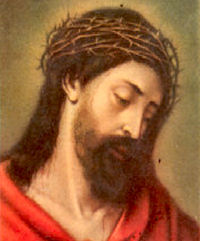
Daily Readings for: March 29, 2012
(Readings on USCCB website)
Collect: Be near, O Lord, to those who plead before you, and look kindly on those who place their hope in your mercy, that, cleansed from the satin of their sins, they may persevere in holy living and be made full heirs of your promise. Through our Lord Jesus Christ, your Son, who lives and reigns with you in the unity of the Holy Spirit, one God, for ever and ever.
» Enjoy our Liturgical Seasons series of e-books!
Lent: March 29th
Thursday of the Fifth Week of Lent
"Then in anger his master handed him over to the torturers until he should pay back the whole debt. So will my heavenly Father do to you, unless each of you forgives your brother from your heart." (Mt. 18:35) No one is merciful like God, and no one pardons as God pardons. The mercy of the Jews was confined to forgiving seven times. Jesus desires that His disciples should always forgive — even to seventy times seven times.
Converting Our Hearts Every Day
The Season of Lent for every Christian should mark a turning point, accentuating that change in thought and life which becomes daily in those who truly wish to follow Jesus. In the Gospel the word “daily” is heard many times, for example speaking of the demands of discipleship, the Lord says: “every day” it is necessary to take up the cross and follow Him (cfr. Lk 9, 23). “ Every day ” is synonymous with “totality,” donation, which, because it is “daily”, renews itself and never breaks up, never weakens. Just as running water flows continually and is always fresh and clear, so too the spiritual life: to maintain its vivacity it draws continually from the grace which flows from Jesus. In this sense we clearly understand the necessity to “pray without ceasing”.
A great temptation on the path of conversion is to stop, to “stagnate”: we remain as we are, we do not to renew ourselves, and in doing so deceiving ourselves and others with a “Christianity” consisting of habits and “goals reached”. The journey of Lent invites us to remove these illusions, the word of Jesus resounds louder than ever: “repent and believe in the Gospel”. To be authentic conversion should never stop; the true Christian experiences the dynamics of conversion, like walking behind Jesus, on a path which never stops because it is at the spiritual level, if we stop, we go backwards! “ 'Once the hand is laid on the plough, no one who looks back is fit for the kingdom of God.'” (Lk 9, 62).
So as not to interrupt our conversion, our journey of 'becoming' Christians, the only possibility is daily conversion: denying ourselves, our ambitions every day, with the dynamic power of love. Selfishness has its own dynamics, which is also daily and drives us to satisfy 'ego'. Only the disciple who gives himself entirely to the Lord, day after day, becomes increasingly similar to his Master and lives in joy, light and love.
If a Christian says he has no joy, light or love then he must make a profound examination of conscience to discern areas where the power of selfishness prevails over the dynamics of conversion.
It is not God who is sparing with himself, or who hesitates to give Himself to us, it is man, as St Teresa of Avila says so well: “ If we attain to the perfect possession of this true love of God, it brings all blessings with it. But so niggardly and so slow are we in giving ourselves wholly to God that we do not prepare ourselves as we should to receive that precious thing which it is His Majesty's will that we should enjoy only at a great price.” (Life, chapter 11, paragraph 1).
Dying to self costs, but it obtains the greatest result: it allows Jesus to live in us. In fact there can be no dynamics of conversion, without daily “renouncing self" precisely to live for Jesus. The Word of God says clearly that only those who lose themselves, who give themselves entirely to God, truly find Him and enjoy Him here on earth: “ If, however, from there you start searching once more for Yahweh your God, and if you search for him honestly and sincerely, you will find him.” (Deut 4, 29). The Lenten journey is therefore a path of self-giving and trusting in God which culminates at Easter with new birth in Jesus. The Holy Father, Pope Benedict XVI, describes this dynamics with the following illuminating words: “ Jesus' invitation to take up one's cross and follow him may at first sight seem harsh and contrary to what we hope for, mortifying our desire for personal fulfilment. At a closer look, however, we discover that it is not like this: the witness of the saints shows that in the Cross of Christ, in the love that is given, in renouncing the possession of oneself, one finds that deep serenity which is the source of generous dedication to our brethren, especially to the poor and the needy, and this also gives us joy. The Lenten journey of conversion on which we are setting out today together with the entire Church thus becomes a favourable opportunity, "the acceptable time" (II Cor 6: 2) for renewing our filial abandonment in the hands of God and for putting into practice what Jesus continues to repeat to us: "If any man would come after me, let him deny himself and take up his cross and follow me" (Mk 8: 34) and this is how one ventures forth on the path of love and true happiness. (…)let us ask Our Lady, Mother of God and of the Church, to accompany us on our way through Lent, so that it may be a journey of true conversion. May we let ourselves be led by her, and inwardly renewed we will arrive at the celebration of the great mystery of Christ's Pasch, the supreme revelation of God's merciful love.” (Benedict XVI, General Audience 6 February 2008).
Msgr. Luciano Alimandi (Agenzia Fides 20/2/2008; righe 54, parole 792)

The Station at Rome is in the church of St. Apollinaris, who was a disciple of St. Peter, and afterwards bishop of Ravenna. He was martyred. The church was founded in the early Middle Ages, probably in the 7th century.